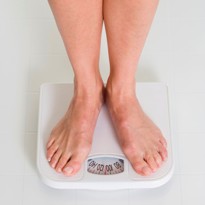Many of us set New Year resolutions. You will not be alone if one of your resolutions focuses on weight loss. A search on Google confirms that weight loss or dieting is one of the top 10 New Year’s resolutions set by people.
Goal setting can be a strong motivator – but if the goal isn’t realistic it can set you up for failure. Many people will set a goal of achieving a certain weight or fitting into a certain outfit.
If you are a person who constantly goes on and off diets perhaps now it is appropriate to review your goal and even think of how you may achieve this by using a different approach.
Often goal weights set by people are focused around what they used to weigh before they had children, or for men it may be what they weighed when they were playing rugby in their earlier years, or it may be a weight you achieved once before with considerable effort that could not be sustained.
One thing to keep in mind is that health benefits are achieved with a weight loss of 5-10%. Certainly you may benefit from losing more than this, but if you do manage to lose 5-10% weight and keep it off this is fantastic. This would mean that if you weigh 90kg an appropriate initial goal may be in the vicinity of 81-85kg – chances are your goal was closer to 70 kg, and you wanted to achieve it in record time!
Try to avoid going on a ‘diet’. A diet can often reflect a short term change in eating patterns and it is often associated with negative thinking about all the foods you shouldn’t eat.
If you want to improve your eating pattern and ensure you are energized for the day, as well as promoting a better body weight the following factors are all good goals to keep in mind:
- Eat regularly so that you do not get as hungry in between meals. This can lead to better control with your eating. Don’t skip breakfast or lunch – you do not necessarily save on calories by doing this.
- Balance your meals by including some protein and carbohydrate at each meal. This will help ensure your appetite and energy levels are more evenly balanced. Your protein foods include milk, cheese, eggs, meat, fish, chicken, nuts, seeds and dried beans or legumes. Carbohydrate foods are breads, breakfast cereals, crackers, rice, pasta, cous cous, and root vegetables such as potato and kumara.
- Eat slowly and enjoy your foods. Avoid eating on the run or while you are doing other things so you can recognise when you are satisfied.
-
Limit treats but do not completely ban them from your eating pattern, if you ban them you may want them even more.
It is human nature to look for the quick fix. Just as there is every other year, this year is sure to bring its fair share of new wonder diets and tempting new advertisements for fat burning products.
So just in case you feel tempted to jump on the latest band wagon here are some things that you should ask yourself before you get tempted with the latest wonder diet.
Is the diet nutritionally safe – is it well balanced and does it include a good variety of foods from each of the four food groups? We all need to eat foods from each of the four foods groups for health (breads and cereals; fruit and vegetables; dairy products; meat and meat alternatives).
Will you enjoy the food choices or will it become monotonous because it is so rigid and restrictive? A boring and very restrictive eating pattern will not be maintained – not a good sign!
Can you apply the eating pattern to the whole family or will you have to prepare one meal for you and something else for the rest of the family? If it is not easy to follow it cannot be sustained – who wants to cook two meals each night? Buying different foods for you will only add to the cost of the food budget.
Does the diet promote very rapid weight loss? The slower you lose weight the more likely it is to be sustainable – a good guide is to lose 500 grams a week, not 2-3 kg in one week.
Does it promote one key food to help you lose weight – such as grapefruit? Unfortunately there are no magic foods that will ensure or guarantee weight loss.
Remember if a ‘diet’ sounds too good to be true – then it probably is!
Certainly set health goals for the future – but don’t set them in such a way that you have to achieve a specific weight loss or fit a certain clothing size by a certain date. Work on ways to change eating behaviours and attitudes to food. Set small goals and work on your problem times – such as not buying a chocolate bar when you go to fill up with petrol or not helping yourself to the leftovers on the children’s plate.
If you are setting weight loss-related goals they need to be achievable and sustainable. Progress can be made by eating a little less, or a little more sensibly, and exercising a little more. This may not be rocket science and you may feel that by making these small changes you are not doing enough. However if you are persistent and consistent then progress should be seen.




